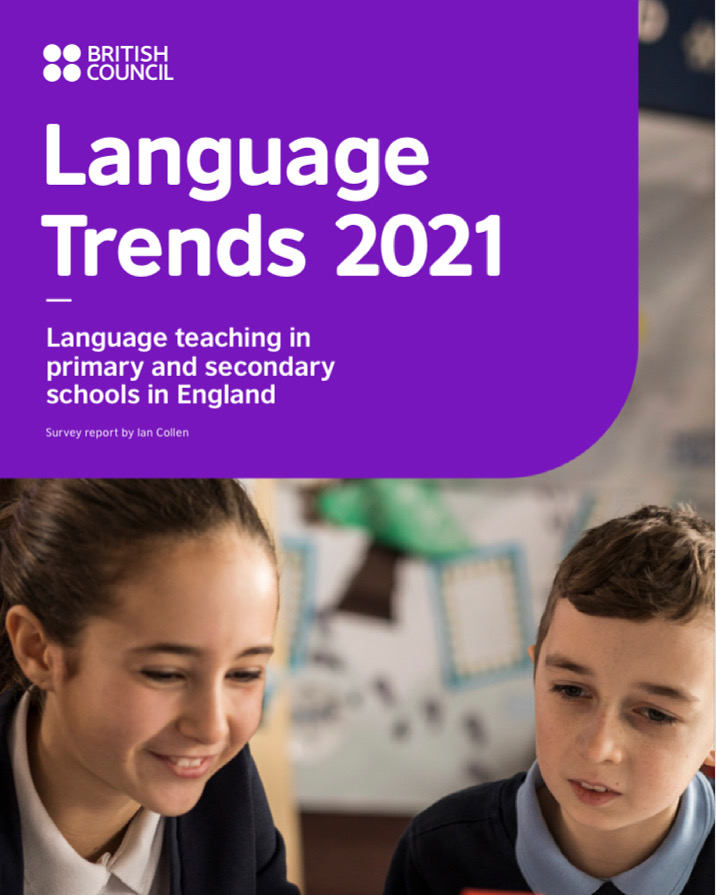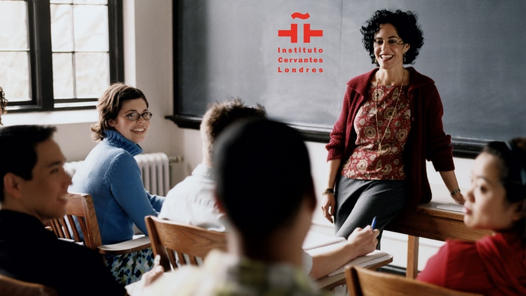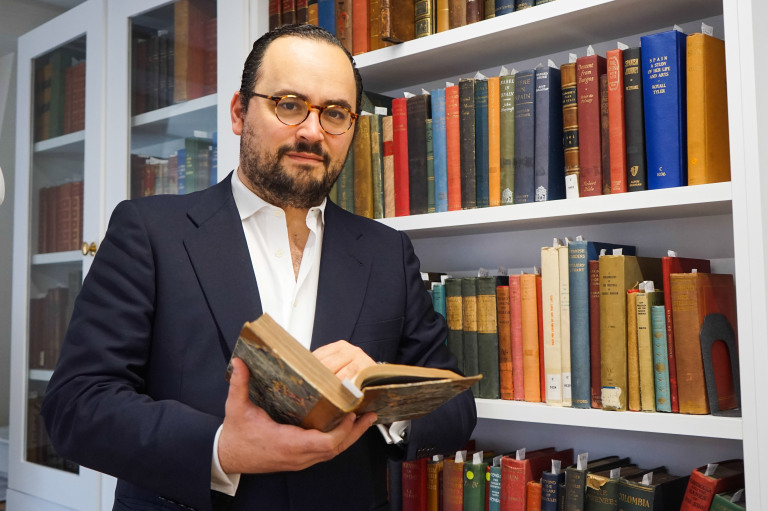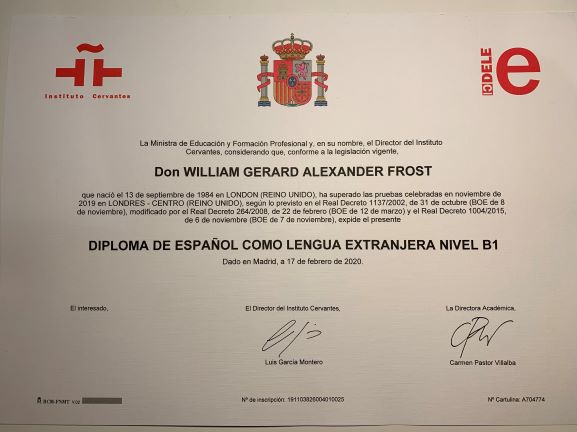Autumn 2021 Classroom and Online Courses
This autum we’ll offer you both onsite courses for those willing to come back to normality and online courses for those who prefer learning from home in a friendly and supportive environement. Check our Autumn 2021 Classroom & Online Courses now!
Formación de profesores de español (ELE)

El Instituto Cervantes de Londres organiza los siguientes cursos de formación de profesores:
Diseño de secuencias didácticas y presentación de contenidos (10 horas) – En línea
- 6 de octubre – 3 noviembre
- 17 noviembre – 15 diciembre
- Descripción del curso
Introducción a la enseñanza de español (10 horas) – En línea
- 2 y 3 de octubre
- Descripción del curso
Cómo preparar clases a distancia (10 horas) – En línea
- 5 octubre – 2 noviembre
- 16 noviembre – 14 diciembre
- Descripción del curso
Curso de formación para profesores de ELE para niños – En línea
- 9 octubre – 11 diciembre
- Descripción del curso
Curso de formación para profesores de ELE de adolescentes: preparadores de GCSE y A LEVEL de español – En línea
- 7 octubre – 9 diciembre
- Descripción del curso
Curso de gramática para profesores de ELE – En línea
- 6 octubre – 8 diciembre
- Descripción del curso
Cursos para preparadores y examinadores de DELE – En línea
- Nivel A1 – A2: £150 (6 septiembre – 3 octubre) / (8 noviembre – 5 diciembre)
- Nivel B1 – B2: £150 (4 – 31 octubre)
- Nivel C1 – C2: £160 (8 noviembre – 5 diciembre)
- DELE Escolar Nivel A2/B1: £140 (4 – 31 octubre)
- Descripción de los cursos
Matrícula
Para matricularte, descarga este formulario y envíalo con tus datos y copia de la transferencia realizada a cenlon@cervantes.es y te enviaremos la confirmación de la matrícula.
El plazo de matrícula se cierra 24 horas antes del comienzo del curso. En el caso de que se reciban solicitudes una vez cerrado el plazo y solo si hay plazas disponibles, se podría tramitar la matrícula pero no se asegura el acceso del alumno a la primera sesión del curso.
Spanish is the most popular A-level language for the second year in a row

For the first time, Spanish attracted over 100,000 GCSE entries – almost double the 2005 statistic – and was the most popular A-level language for the second year in a row. If current trends continue, the report predicts that Spanish is likely to overtake French as the most popular GCSE language by 2026, according to a new British Council report published today.
The Language Trends 2021 report surveyed teachers at more than 1500 primary, secondary and independent schools across England. The report, which has been published annually by the British Council for nearly twenty years, gathers information about language teaching and learning in England.
At Key Stage 3, Spanish is taught by 74 per cent of responding state schools and 89 per cent of responding independent schools.
To read the full report, please visit: https://www.britishcouncil.org/research-policy-insight/research-reports/language-trends-2021
Spanish course for beginners with trainee teachers

Join our 25h Spanish course for beginners with trainee teachers monitored by our native academic staff.
Cost: £25, to be refunded if the student attends 80% of the sessions.
12 to 23 July, Monday to Friday, 10am to 12:30pm.
Enroll now: cenlon@cervantes.es or calling 020 7201 0750
For more information about our courses, please visit our website.
El español a la cabeza
El Bulletin of Advanced Spanish pasa revista a la situación de la lengua española en Reino Unido con Ignacio Peyró, director del Instituto Cervantes en Londres.

El pasado mes de junio el estudio anual sobre las lenguas extranjeras que publica Language Trends –con el apoyo del British Council – mostraba que, por primera vez en la historia, el español había superado al francés en el número de alumnos que habían realizado los exámenes de A-level. Un aumento de más del 5% frente al año anterior. Ese mismo informe apuntaba que si la tendencia seguía siendo la misma, en 2030 el español se convertiría en la lengua extranjera más popular en el Reino Unido. Unos meses más tarde, la Joint Council for Qualifications confirmaba la misma tendencia al mostrar que en el verano de 2020, el número de candidatos al examen de español fue de 8707 alumnos, frente a los 8263 de francés o los 2849 de alemán.
Leer más en la web de Bulletin of Advanced Spanish
Learn to connect, connect to learn.
Learning a new language expands your world.
connects you with more people, more opportunities
and opens up new doors, pathways and challenges
Because learning a language is more than just earning a certificate:
It is discovering how being understood makes you a part of things;
It is understanding how to reach the hearts of others.
Instituto Cervantes, 30 years dedicated to making Spanish
a greater, more universal language
connecting more and more people.
Now, all our experience, and our highly qualified teachers,
are available in our on-line courses.
Taking Spanish to every corner of the world
and your heart to wherever it desires.
Instituto Cervantes.
Learn to connect,
connect to learn.
#InstitutoCervantesenlínea
William Frost: «I think Spanish is a wonderful language and I feel like it is the most useful language to be learning right now»

William Frost is originally from Shrewsbury, but now he lives in Canterbury. He has moved around a lot as he teaches English as a foreign language; he spent two years teaching in Cologne, Germany. He also taught in London for some time where he came into contact with a lot of Spanish and Spanish speaking students.
He has done some independent journalism and video making mainly on the topic of Latin America and Iberia. Now he is training to become a secondary school teacher at Canterbury Christ Church University specialising in Spanish and French (Modern Foreign Languages). He is really enjoying this new challenge as it requires a lot of different skills.
– How did you become interested in learning Spanish?
Good question! I have always been interested in languages, but for a long time I knew almost no Spanish as I did not learn it at school or university. It soon became clear to me that if I wanted to have a career in languages then knowing at least some Spanish would be essential as it is such a widely spoken language in the world.
It was actually mainly through friends and ex-students that I had taught that got me into learning Spanish. I have found that if you make an effort to learn the language then native speakers will always encourage you, to help you progress.
– What do you like the most about Instituto Cervantes London?
I did used to go there to use the library which is fantastic; there is an brilliant selection of resources such as books, magazines, newspapers and films. The variety of books is great as you can find grammar and text books but also literature, history and art books. It caters to all tastes.
I also attend the conversation clubs. When I lived in London I used to go to the institute in person, but now I access them online. These are great sessions where we discuss a different topic each time, subjects like urbanism, global warming and climate change. The best thing about the sessions is that they are spaces where you can practice your speaking and listening skills in an unpressured environment. There are always native speakers conducting the sessions so if you are struggling with something they will help you out. Speaking is the skill I find most challenging so this benefits me a lot.
I have also attended some online cultural events such as a tribute to Mario Benedetti which as great as there were some live poetry readings in Spanish and English. I have a special interest in Uruguay so that one really caught my eye. The accent in that part of that world is a bit different so it was good to be able to listen to it. Uruguay is an amazing country and I hope to go back there when my Spanish is better!
– What do you like the most about learning the language?
What I like about learning Spanish is that you know that what you are learning is highly useful as so many countries in the world speak it as their mother tongue. This means that you have an insight into other parts of the world, especially Latin America. Also the sheer variety of different resources available means that whatever you are interested in you will be able to find something in Spanish. I have been watching some documentaries about South America on Netflix in Spanish recently which has helped a lot. I am also a fan of Pedro Almodóvar’s films so I enjoy watching them.

– Do you use Spanish in your daily life or do you plan to use it for your work?
I do use Spanish as part of my teacher training and I intend on using it a lot more when I qualify. Spanish is growing steadily in popularity at schools and this is reflected in the rise in pupils choosing to take it at both GCSE and A levels.
I also use it to read Spanish language newspapers online such as El País, which helps me keep up to date with what is going on.
– Why did you become interested in getting a certificate for Spanish language?
I became interested in doing the DELE certificate really because I wanted to know what my level was and what I needed to improve on. In that respect it was really useful. I also think it is really practical to have a clear goal in mind to focus your studies. That extra bit of pressure helps to structure what you are learning. It is also something more concrete to put on your CV or to talk about at interview.
I was lucky enough to visit the Cervantes Institute headquarters in Madrid last year were I saw some interesting exhibitions about Spanish in the world. It was there that I found out about the DELE exams. It is a fantastic place; if you get the chance to visit, I highly recommend it.
– How did you find the exam?
The exam was like all exams, a bit nerve wracking but completely worth it. You get a good sense of satisfaction once you find out you have passed! I had my speaking at the institute in central London and the other parts at the Cañada Blanch School in Kensington. Everything was seamlessly organised and ran smoothly. All of the staff at the Cervantes were very friendly and professional.
The certificate you get is the most elegant document I have ever seen. It was addressed to “Don William” which made it seem very official but I also it found hilarious!

– Do you plan to continue studying Spanish?
I definitely plan to continue studying Spanish, I think it is a wonderful language and I feel like it is the most useful language to be learning right now. Learning in a language is a marathon not a sprint so I am in it for the long haul. It took me ages to remember that piragüismo means canoeing and I recently learned that pencil sharpener is sacapuntas. And I still get a bit confused between ustedes and vosotros, but I’m getting there! You have to keep topping up and refreshing your knowledge as it’s so easy to forget vocabulary! I am also considering taking the DELE B2 or C1 exam next year. ¡Adelante!
The Cervantes Institute has been brilliant in helping me improve my Spanish. But I have also learned about Spanish culture and how the language is used all over the world. At the moment, as travelling is so challenging with the pandemic, all of the online events and resources have been fantastic.
Cursos de Formación de Profesores de Español – Enero 2021
El Instituto Cervantes de Londres ofrece a los profesores de español de todos los niveles la a posibilidad de seguir formándose con regularidad. En estos cursos de formación se actualizan conocimientos didácticos, metodológicos y lingüísticos. Asimismo, los futuros profesores de español pueden realizar estos cursos como preparación para su futura carrera profesional. Consulta todos los cursos disponibles en nuestra web.
Online Winter 2021 Spanish Courses
Due to the ongoing Covid-19 situation all our 2021 Winter Courses will be taught online in a friendly and supportive environment using video conferencing and distance learning tools. Check all our courses here.



